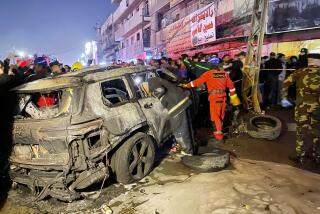Iraqi forces, Islamic State fighters duel for control of Ramadi
Iraqi forces battled Islamic State fighters for control of Ramadi on Thursday, officials said, attempting to thwart the militant group’s latest bid to overrun government-held areas of Anbar province.
Ramadi, the capital of Sunni Muslim-dominated Anbar province, has been the site of repeated clashes between government forces and Islamic State. The latest assault by the militants has been the most forceful, however, as they wrested control of areas to the north and east of the city on Wednesday.
“The situation today is much better than yesterday. Yesterday was very bad; army and police personnel retreated,” said one provincial official on Thursday. “But today there were some good airstrikes by coalition forces and the Iraqi forces regained the main areas in Ramadi and stopped the advance” of the militants.
The official requested anonymity because he was not authorized to speak with the media.
The U.S.-led coalition supporting the Iraqi government reported Thursday that it had carried out eight airstrikes in Anbar, including four near Ramadi, about 60 miles west of Baghdad.
Gen. Saad Maan, spokesman for the Iraqi Joint Operations Command, insisted Thursday that the city was “completely in the hands of the security forces,” Iraqi state news Al Iraqiya reported. He added that “preparations are underway to launch a large military operation to liberate” areas near Ramadi under Islamic State control.
Anbar officials, however, said the city was not yet fully secure but that Iraqi troops had control of the main roads and government compounds.
The offensive on Ramadi comes as Iraqi Prime Minister Haidar Abadi visits the U.S. to seek further support for Iraq’s beleaguered forces.
In a meeting with the Iraqi community Thursday in Washington, he stressed that “Anbar is facing large pressure from [Islamic State] and we have thousands of youth fighting with us.”
On Wednesday, head of the Anbar provincial council Sabah Karhoot, along with Gov. Suhaib Rawi, called upon the government to ramp up coalition airstrikes against the Islamic State and send in additional forces.
Absent from the battle were the Shiite Muslim militias that played a key role when government forces recently retook the city of Tikrit, about 80 miles north of Baghdad. Thousands of Shiite men joined regular military units to wrest control from the Islamic State, which had seized the city last June.
Although the Shiite militias, known as Popular Mobilization Units, spearheaded the Tikrit offensive, many Sunni officials were wary of their participation in Anbar, especially after allegations of sectarian-driven abuses by militiamen against Tikrit’s Sunni population.
“Anyone who wishes to fight for Anbar is welcome to do so under the banner of the Iraqi forces, which reports directly to the prime minister’s office,” said the official from Anbar. “But we are against bad practices, regardless of who commits these acts, whether they are security forces or the Shiite militias.”
Popular Mobilization spokesman Karim Noori said negotiations were ongoing to bring in the militias to the Anbar fight, but they were still waiting for an “official call for help” from provincial officials.
“The regular security forces are not up to the job,” Noori warned in a telephone interview Thursday. “Every area without the Popular Mobilization fighters will fall to Daesh,” he added, using the Arabic acronym for Islamic State.
However, a spokesman for Anbar’s governor said Thursday that militiamen loyal to radical Shiite cleric Muqtada Sadr, dubbed “The Peace Brigades,” were stationed in areas between Ramadi and the nearby city of Fallouja to support the government’s military campaign.
“They are some of the most disciplined fighters among the militias, and they will help us in the fight,” said the spokesman, Hikmat Suleiman, by phone from Baghdad.
He also reported many refugees had left Ramadi and its surrounding areas, but said that “only a very small number of them are allowed into Baghdad because of security concerns.”
Bulos is a special correspondent.
More to Read
Start your day right
Sign up for Essential California for news, features and recommendations from the L.A. Times and beyond in your inbox six days a week.
You may occasionally receive promotional content from the Los Angeles Times.







